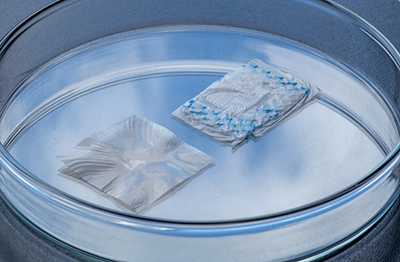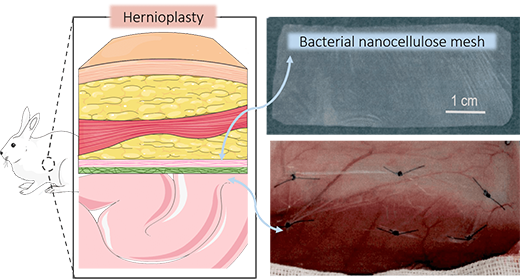| Apr 20, 2021 |
Bio-nanocellulose meshes improve hernia repair surgery
(Nanowerk News) Bacterial nanocellulose is an emergent biocompatible natural polymer with increasing applicability in the healthcare sector. A potential innovative application can be found in the design of surgical meshes for the treatment of abdominal hernias. Researchers from ICMAB-CSIC and B. Braun Surgical, a leading manufacturer of medical devices for wound closure, have collaborated to develop a bio-based surgical mesh with this biomaterial. First results from an in vivo animal study yield promising outcomes.
|
A common surgical procedure with avoidable complications
|
|
20 million patients worldwide suffer abdominal hernias every single year, a common condition that can only be addressed through surgical intervention.
|
|
An abdominal hernia involves an internal organ protruding through a small hole or a weakened zone in the walls of the abdomen. A key part of the intervention is the reparation of the abdomen through the use of a surgical mesh that provides mechanical support to the weakened area. Those meshes are predominantly manufactured from synthetic polymers such as polypropylene (PP).
|
|
Complications in hernioplasties might involve foreign body reactions and fibrotic adhesion between the mesh and viscera, with high rates of adhesion being reported in approximately 15 % of the cases one year after surgery.
|
|
“In this context, strategies to minimize foreign body reactions are needed, since fibrotic adhesion around the implant can trigger a cascade of complications leading to a reoperation of increased complexity”, explains Anna Roig, leader of the Nanoparticles and Nanocomposites (NN) group at the Institute of Materials Science of Barcelona (ICMAB-CSIC).
|
|
Beyond possible recurrent operations, adhesions can cause severe chronic pain, digestive disorders or infertility. Such medical complications motivate current efforts to reduce any side effect that may arise from the implantation of surgical meshes.
|
 |
| Samples of bacterial nanocellulose meshes. (Image: ICMAB-CSIC)
|
Towards improved anti-adhesion surgical meshes for hernioplasty
|
|
A strategy for the improvement of surgical meshes is to physically isolate the PP mesh from the viscera adding an anti-adhesion barrier. The study published in Biomaterials Science ("In vivo soft tissue reinforcement with bacterial nanocellulose") presents bacterial nanocellulose as a well-suited biomaterial to create this barrier.
|
|
Bacterial nanocellulose is an emergent biocompatible natural polymer with increasing applicability in the healthcare sector, such as in wound dressings, anti-fibrotic protectors for cardiac implants or bio-patches to treat corneal disorders. A potential innovative application shown in this study is the design of surgical meshes for the treatment of abdominal hernias.
|
|
The work provides new information on the biomaterial mechanical suitability for soft tissue reinforcement evaluated in a range of formats: dry, wet, monolayered, double or triple-layered, and combined with PP meshes.
|
|
In vivo studies with animals (rabbits) indicate that bacterial nanocellulose presents adequate handling, suture fixation, manageability and accommodation to the implantation site. After a follow-up of 21 days, the performance of the biopolymer as a soft tissue reinforcement material was evaluated by macroscopic observations and histological analysis.
|
|
Interestingly, bacterial nanocellulose caused few adhesions, involving only 8 % of the total implanted surface, and the bio-meshes were well integrated into the abdominal wall. Good post-operative recovery indicated that the material was well tolerated by the animals.
|
 |
| Bacterial nanocellulose surgical meshes have been tested in in vivo studies for suturing abdominal wall wounds in rabbits. (Image: ICMAB-CSIC)
|
Public-private collaboration
|
|
These results have been achieved through the collaboration between the Nanoparticles and Nanocomposites Group at the Institute of Materials Science of Barcelona (ICMAB-CSIC), led by Anna Roig, and the R+D Department of B. Braun Surgical, which focus their research and innovations on biomaterials for surgery. To do so, fabrication and basic characterization were performed at ICMAB facilities, while the sterilization, mechanical properties characterization and implantation were managed by B. Braun, following the required standardized protocols for the intended use.
|
|
Pau Turon, vice-president of B. Braun R&D department stated that “the collaboration between public and private institutions to develop innovative concepts for surgery is one of our priorities as it merges the best of the two worlds”.
|


